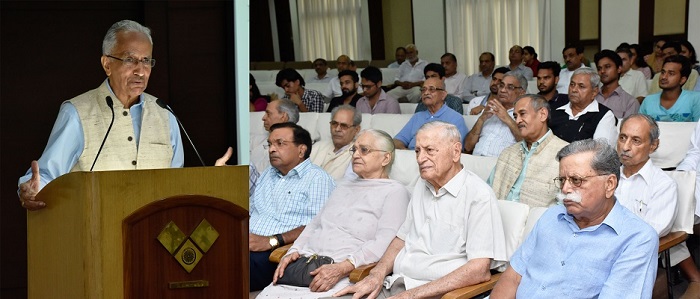Shri Prakash Singh, former DG BSF, delivered a perceptive talk, ‘Preparing The Central And State Police Forces To Deal With The Multi-Dimensional Challenges Of Tomorrow’, at the Vivekananda International Foundation (VIF) on 15 Sep 2016, as part of VIF’s monthly series of lectures, ‘Vimarsha’. A large audience, comprising former bureaucrats, diplomats, military veterans, members of the academia, among other informed citizenry of Delhi, attended the event and also participated in a lively interaction with the distinguished speaker following the lecture.
The session kicked off with General NC Vij, Director, VIF, underlining that police modernization in India has been hanging fire for a long time even though challenges to India’s internal security have gone up considerably in recent years. While the police suffer from a plethora of problems, including criminalization and politicization among other problems, neither the states nor the centre have been willing to undertake police reforms, both throwing the ball in each other’s court. He stressed further that piecemeal reforms are not going to work any more, as such a wholesome approach to police modernization remains the only answer.

Shri Prakash Singh, who has been crusading tirelessly for police reforms in India, spoke dispassionately about a distressed police force fighting against all odds to keep the country safe from multitudes of internal threats – terrorism, transnational crimes and left wing extremism, among others. He also pithily commented that policing in India was perhaps more difficult than policing anywhere else in the world. He analysed India’s increasingly complex and multispectral threat environment, as also the difficulties besetting the police force in dealing with it – under-staffed, long working hours, obsolete equipment, poor training, miserable living conditions, and low morale, among other problems. Worse still, the police continue to be governed by an archaic 1861 Police Act. It is therefore no surprise that the police suffer from an image crisis in India. The observations made in 1902 by the Chairman of the Second Police Commission about the Indian police being ‘corrupt’, ‘inefficient’ and ‘oppressive’ etc. still holds good. An ineffectual police force not only hurts the people and their security but also discredits the government, the erudite speaker cautioned.
A much sought after voice on police reforms in India, Shri Prakash Singh further underlined that while several commissions and committees have been formed since 1902 to look into police reforms, their recommendations continue to gather dust. A dismayed Prakash Singh even had to approach the Supreme Court in an effort to nudge the political establishments towards the police reforms, but to no avail. Taking the lead, the Supreme Court had passed seven directives to the central and state governments insofar as police reforms in India are concerned. These directives related to setting up of state security commissions, fixed tenure for police chiefs and other police officers, separation of investigation from law and order and establishment of police complaints authorities and police establishment boards. Ten years on, those directives continue to hang fire even as governments across the country have found convenient ways to circumvent the Supreme Court’s passed directives. The highest court of the land had mandated that the directives were to remain in force till state governments passed their own legislations. While a few governments passed acts that were not in tandem with the Supreme Court directives, there were also others who hurriedly passed acts only to escape the directives.
Shri Singh urged that the Central Government should take the onus to pass an effective Police Act which would also serve as a model for the state governments. Among other important articulations in Shri Prakash Singh’s lecture, he underlined the need for a comprehensive internal security doctrine and a strong legislation to act against organized and trans-national crimes. Taking cognizance of the controversial use of pellet guns during the ongoing crisis in Kashmir, he said such controversies would not have arisen if we had a well laid down procedures for crowd control, enshrined in a national security doctrine. Keeping in view the excessive work-load on the Indian police as also refurbishing its image, Shri Prakash Singh also suggested that social crimes such as beggary, prostitution, domestic violence etc. should be kept out of the purview of India’s police. Among other takeaways, he put the spotlight on modernizing weaponry and communication equipments of the police force in India.


